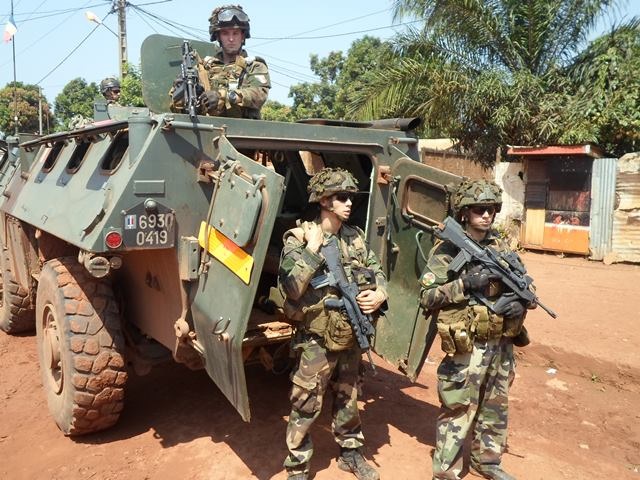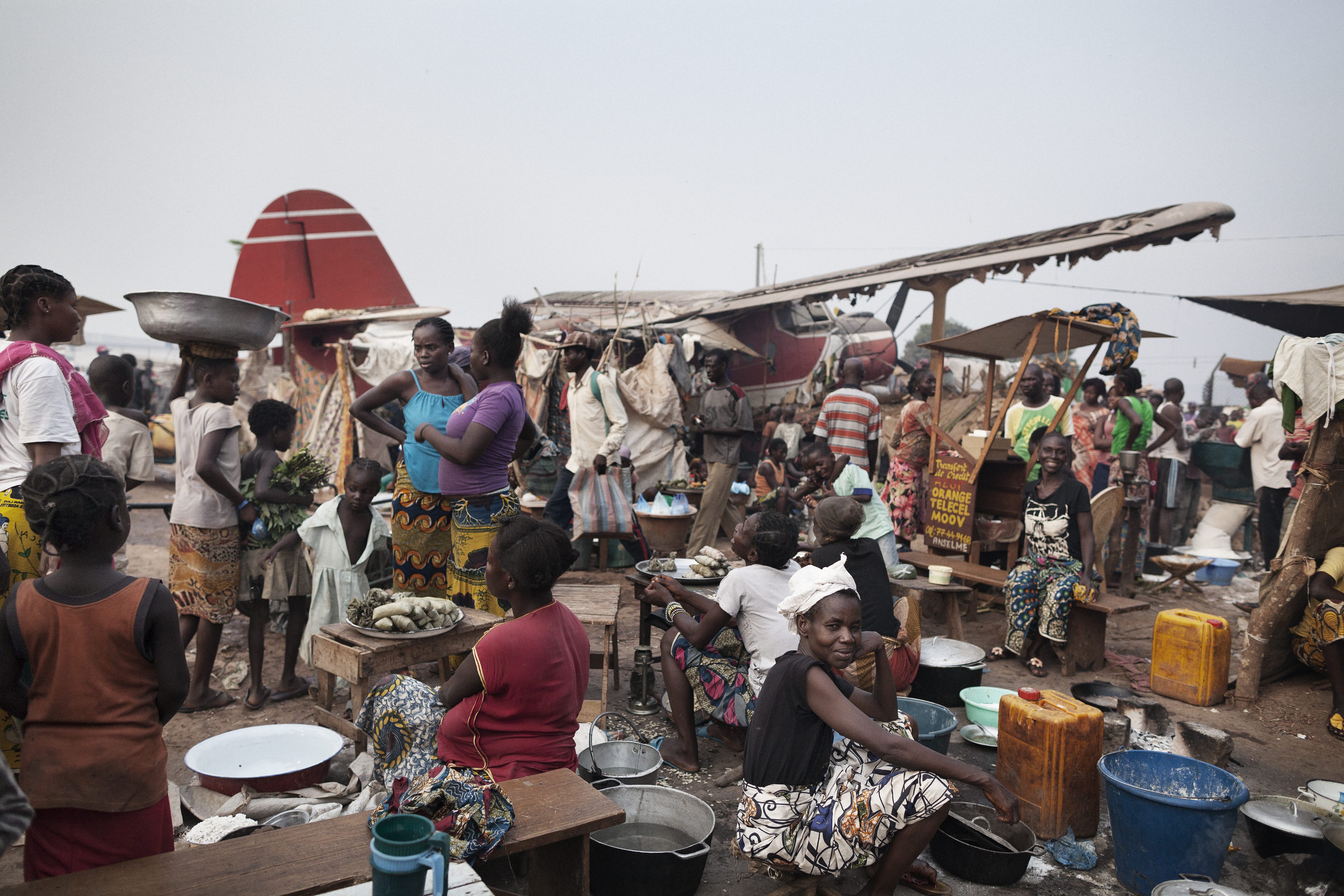As French investigators prepare to return to Central African Republic to look further into two-year-old accusations that French soldiers deployed in the country sexually abused children, there is no sign of any criminal charges being laid any time soon, let alone of convictions being secured.
This is despite the fact that accounts provided to UN staff by child victims and witnesses in May and June 2014, and given to French authorities in July 2014, included the names of the children and some nicknames and physical characteristics of 11 alleged perpetrators serving in France’s Sangaris military mission.
The force deployed with the blessing of the UN Security Council and at the request of CAR’s president in December 2013, a time when clashes between rival armed groups gave rise to fears of genocide and forced hundreds of thousands of people to flee their homes.
The reported abuse occurred in a camp for displaced civilians at Bangui airport, under the protection of French and UN peacekeepers.
The allegations described in these accounts include French soldiers requesting and in several cases receiving fellatio from young boys in return for food and money; one French soldier urinating in the mouth of one of his victims; and soldiers from Chad and Equatorial Guinea deployed under the UN mission anally raping young boys. The alleged abuses took place in late 2013 and early 2014.
These incidents, and four other cases of alleged physical abuse committed by Sangaris troops in CAR, are currently under investigation.
No progress
The office of the Paris prosecutor in charge of the dossiers told IRIN there had been no significant progress in the main case since May 2015, when discreet preliminary investigations launched the previous August were upgraded into a full-scale, well-publicised criminal enquiry involving the appointment of magistrates. The change in status came soon after the Guardian newspaper broke the story of the alleged sexual abuse.
Read more
Exclusive: Top UN whistleblower resigns, citing impunity and lack of accountability
In the absence of military courts, crimes committed by French soldiers abroad are dealt with by the civilian justice system, specifically the military wing of the office of the prosecutor of the High Court in Paris.
France’s justice system is inquisitorial, rather than adversarial, which means the role of these magistrates is not to build a case for the prosecution but to look impartially into the circumstances of an allegation to determine whether criminal charges are merited.
Until convicted in court, suspects enjoy the presumption of innocence, a point that has been emphasised by the army high command in the main CAR case. (There is a separate case of alleged sexual abuse against two minors, one aged five, by two French troops deployed in Burkina Faso: the pair were immediately suspended. The Paris prosecutor is also looking into this case.)
When accusations involve members of the armed forces, military police are also involved in the investigations.
“We are not going to see anyone before all the facts are verified,” the head of military police told a French documentary last year when asked why investigators had not yet questioned any of the Sangaris suspects.
The investigators returning to CAR this summer are due to talk with child victims and witnesses who have not yet been interviewed. But this doesn’t necessarily mean any charges will then be brought.
“They are right,” a source in the Paris prosecutor’s office said of those who have lamented that the case is very unlikely to come to trial. While declining to comment on whether the veracity of the allegations had been established, the source said none of the cases had actually been dropped.
Zero tolerance?
This is a case that illustrates the apparent chasm between regular public pronouncements about zero tolerance for crimes committed by troops serving in peacekeeping missions and actually delivering justice for victims of such human rights abuses and international crimes.

“The longer this drags on, the more perpetrators are emboldened, seeing colleagues getting away with dreadful stuff, perpetuating a culture of impunity,” said Paula Donovan of Code Blue, a campaign run by the NGO Aids-Free World to end impunity for UN peacekeeping personnel.
The chronology of the case suggests that key events could have taken place sooner. For example, French investigators only interviewed the children in June 2015. This was almost a year after senior human rights official Anders Kompass – who has since resigned from the UN – handed the interview summaries taken by the UN human rights officer (HRO) in Bangui to the French diplomatic mission in Geneva.
Moreover, the officer herself insists she informed Sangaris commanders in Bangui of the allegations as early as May 2014.
The source at the French prosecutor’s office told IRIN that the June 2015 interviews “did not shed enough light to indict anyone”. Only five of the 14 suspects mentioned in the original summaries could be identified, the source added.
The French investigators interviewed these five in December 2015 – two months after the documentary aired.
UN foot-dragging
Within the UN bureaucracy, the contortions and delays in reporting key information were set out in excruciating detail in a report issued by an external panel of experts in December 2015.
As well as lambasting a range of senior UN officials for their actions and inactions in the affair, the report lends credence to France’s claims that its investigations were severely hampered by the UN’s refusal to allow key staff members to be directly interviewed and its insistence that convoluted “official channels” be followed.
“Exchanges between the French Permanent Mission [in New York] and the UN, including with their respective senior officials and legal offices, took weeks for each round of communication,” according to the panel.
French investigators initially approached the HRO and a UNICEF staff member in Bangui in August 2014. But it wasn’t until the following April that, guided by the UN’s Office of Legal Affairs, she provided answers to their questions, which had to be submitted in writing, nor until July 2015 that UN Secretary General Ban Ki-moon waived her legal immunity, a privilege all UN staff enjoy.
“[I]mmunity should not be a bar to UN officials and experts on mission when they are called to testify as witnesses to crimes of sexual violence,” the panel said in its recommendations.
In denial over abuse?
Emmanuel Daoud, a lawyer for ECPAT, an NGO working to end the sexual exploitation of children and acting as a “civil party” in the criminal proceedings, agreed that the use of immunity had been a problem for the investigators. But he dismissed any suggestion that French investigators had been dragging their feet, insisting they had worked “very professionally”.

He said it wasn’t unusual for such investigations to take so long and pointed out that this was a particularly complex case, not only because the crimes took place in a foreign country in the throes of violent unrest (with interviews requiring translators), but also because the implicated Sangaris troops had rotated out of CAR – in one case to Afghanistan.
Even when conducted in France, criminal investigations in rape cases last three years on average, with trial verdicts coming only five years after complaints are lodged, according to a 2013 book entitled Rape, an Almost Ordinary Crime.
For its part, the UN Secretariat maintains it acted correctly all along. In May 2015, Ban’s spokesman Stéphane Dujarric told reporters: “We very much cooperated with the French judicial authorities on this… And I think the issue of [the] lifting or not lifting of immunity is not really pertinent in this case.”
Perhaps surprisingly, given its own vociferous criticism of the UN’s inability to prevent and punish sexual violence committed by peacekeeping troops, Code Blue agrees.
“In this particular instance, the argument about immunity as the main impediment to the French investigation doesn't hold water” because of the extensive details contained in the HRO’s initial report, explained Aids-Free World’s Communications Director Gill Mathurin.
But this doesn’t mean Mathurin believes mistakes weren’t made. Had the UN alerted the French authorities back in May 2014, “it is likely that they could have prevented subsequent abuses from occurring”, she said.
In April 2016, the UN said 108 more victims in CAR, mostly underaged girls, had come forward with accounts of sexual abuse (including bestiality) committed between 2013 and 2015, allegedly by UN and French troops.
Three months earlier, reports had come to light of yet more abuses, allegedly committed in 2014 by troops from France and other countries on children as young as seven.
am/oa/ag
Lead photo: French troops on parade, by Luc Lagarde/Flickr





